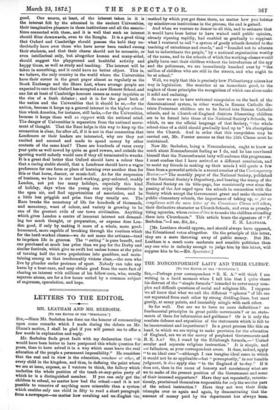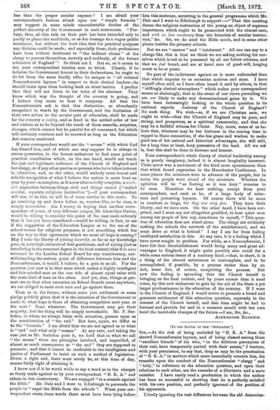THE NONCONFORMIST LAITY AND THEIR CLERGY.
[ToTHE EDITOR OF THE "SPECTATOR."]
SIR,—Perhaps your correspondent "B. K. A." will think I am. writing in a lucid moment when I tell him that I quite share- his distrust of the "simple formula" intended to cover many com- plex and difficult questions of social and religious life. I suppose we all know that what we call the different " spheres " of life are not separated from each other by strong dividing-lines, but meet gently, at many points, and insensibly mingle with each other.
So far well. But are we to have no more definitions ? no fundamental principles in great public movements ? or no state- ments of them for information and guidance ? Or is it only the resolute defence and exposition of the statements which is felt to be inconvenient and impertinent ? In a great process like this on hand, in which we are trying to make provision for the education of England, are we at the mercy of perplexed Governments and B. K. A.s? Sir, I stand by the Edinburgh formula,—" United secular and separate religious instruction." It is simple, and not fallacious, as your correspondent avers. It does, indeed, apply "to an ideal case "—although I can imagine ideal cases in which, it would not be so applicable—but "peremptorily," in our humble judgment, it does apply also "to the England of to-day." If it does not, then in the name of honesty and consistency what are we to make of the present position of the Government and some of their incensed supporters? Have they not repeatedly, ostenta- tiously, proclaimed themselves responsible for only the secular part of the school instruction ? Have they not won their little- triumphs over us again and again, by demonstrating that the of money paid by the department has always been
leas than the proper secular expense ? I am afraid your correspondent's furious attack upon our "simple formula" may suggest in some minds uncomfortable doubts of the perfect sincerity of the Government in such statements. "Per- haps, then, all this talk on their part has been intended only to pacify or please the multitude, or as due homage to a vague public sentiment, but without the least idea that for practical purposes any division could be made ; and especially these, their professions have been without detriment to "the indirect claims" of the clergy to possess themselves, secretly and suddenly, of the future education of England " ! So think not I. But so, as it seems to me, your correspondent teaches men to think. Clearly, if he believes the Government honest in their declarations, he ought to do for them the same kindly office he assigns to "all rational Nonconformist laymen" in respect to their clerical leaders—he should insist upon them harking back on wiser tactics. I predict that they will not listen to the voice of the charmer. They know which way the thought of the country is going, and I believe they mean to bear it company. All that the Nonconformists ask is that this distinction, so abundantly recognized in words by the Government, and thelimitation of their own action to the secular part of education, shall be made for the country a reality, and so fixed in the settled order of law and custom as to be beyond the reach of those assaults, surprises, changes, which cannot but be painful for all concerned, but which will certainly continue and be renewed as long as the Education Act remains unaltered.
If your correspondent would use the "senses" with which God has blessed him, and of which one may suppose he is always in serene possession, in the honest endeavour to find some point of practical conciliation which, on the one hand, would not touch the just and legitimate influence of the Church of England and her clergy, or of any other parties or persons who have taken interest in education, and, on the 'other, would embody some honest and reliable recognition of what I believe the nation is more bent on year by year—a complete, or if never abstractedly complete, a work- able separation between things civil and things sacred (" united secular, separate religious instruction ")—if your correspondent will aim to do this, he will be of some service in this cause. To go marching up and down before us, warrior-like, as he does, is simply moonshine. Am I wrong in hoping that another corre- spondent of yours, of very different temper, Mr. Llewellyn Davies, would be willing to consider this point of the case more seriously than it has yet been considered—would be willing, in fact, to see if the suggestion of the Education League as to the use of the school-rooms for religious purposes, is not something which lies on the way to that agreement which we must all hope is coming? May I take the liberty of joining heartily, as far as my knowledge goes, in your high estimate of that gentleman, and of saying (not as interfering in the remotest degree in the local contest) that if he were returned to the London School Board for any constituency, not- withstanding the serious point of difference between him and the Nonconformists, it would, I believe, be a gain to us all. For the question just now is in that state which makes a highly intelligent and fair-minded man on the one side of almost equal value with the same kind of man on the other. And yet, also, things at pre- sent are so that when vacancies on School Boards occur anywhere, we are obliged to meet such men and go against them.
Then as to the future, without some just settlement or some pledge publicly given that it is the intention of the Government to make it, what hope is there of obtaining compulsion next year, or the next ? None whatever. The Government may get their majority, but the thing will be simply unworkable. Mr. F. See- bohm, to whom we always listen with attention, presses upon us the consideration of "the end." But here, again, we differ as to the "formula." I am afraid that we are not agreed as to what is " end " and what only "means." At any rate, and taking the case just as Mr. Seebohm puts it, we hold that in what we call "the means" there are principles involved, and imperilled, of almost as much consequence as "the end" they are supposed to promote ; and that it cannot be creditable to the intelligence and justice of Parliament to insist on such a method of legislation. Given a right end, there must surely be, at this time of day, means fairly right of attaining it.
I know not if it be worth while to say a word as to the charges so freely made against us by your correspondent "B. K. A." and others in this controversy. We are engaged "in a crusade against the Bible." Mr. Dale and I went to Edinburgh to persuade the people to "expel the Bible from the schools "! When your cor- respondent wrote these words there must have been lying before him this sentence, occurring in the general programme which Mr. Dale and I went to Edinburgh to support ;—" That this meeting deems the religious instruction of the young an object of supreme importance, which ought to be prosecuted with the utmost care, and with no less constancy than the branches of secular instruc- tion," &c. Sir, we do need the Bible much, and in some other places besides the primary schools.
But we are " narrow " and "intolerant." All one can say to a charge like this is that we think we are asking nothing for our- selves which is not to be possessed by all our fellow-citizens, and that we feel broad, and are at heart men of good-will, longing much to be at peace.
No part of the indictment against us is more unfounded than that which imputes to us sectarian motives and aims. I have myself often said, as I have often heard it said by others, in that "stiflingly clerical atmosphere" which makes your correspondent sneeze so alarmingly, that in the event of our views prevailing we are not likely to make any denominational gains by it. We have been increasingly looking at the whole question in its national aspects. Jealousy of the Church of England? No such thing. We wish—as, if we are Christian men, we ought to wish—that the Church of England may be pure, and strong, and prosperous, as a spiritual community, and that she may be a faithful witness for Christ. Nay, more, some of us be- lieve that, whatever may be her fortunes in the coming time in regard to State connection, if she has grace and wisdom to make good use of her natural and historical advantages, she will still, for a long time at least, keep possession of the land. All we ask is, that this shall be done in fairness and honour.
Your correspondent's whole theory of clerical leadership among us is purely imaginary, indeed it is almost laughably incorrect. Theis never was a movement of the kind more spontaneous than that which found expression in the Manchester Conference. In some places the ministers were in advance of the people, but in many the people were ahead of the ministers. Whether the agitation will be "as fleeting as it was fiery" remains to be seen. Meantime we hear nothing, except from your correspondent, and such as he, of a large body of reluc- tant and protesting laymen. Of course there will be some in numbers so large, but they are very few. They have their liberty, and we have ours. On the other hand, I have been sur- prised, and I must say not altogether gratified, to hear quiet men among our people of late say, sometimes to myself, "This ques- tion of education does not stand alone. The clergy are evidently making the schools the outwork of the establishment, and we must drive at what is behind." I say I am far from feeling unalloyed satisfaction in this. At any rate, it is a feeling which I have never sought to produce. For while, as a Nonconformist, I have felt that disestablishment would bring many and great ad- vantages to England, it might quite possibly also entail for a while some serious issues of a contrary kind,—that, in short, it is a thing of the utmost seriousness to contemplate, and to be accomplished, if possible, by a process rather than by an Act, some Act, of course, completing the process. But now the feeling is spreading that the Church herself is bringing on the final contest, and by years sooner than it need come, by this new endeavour to gain by the aid of the State a yet larger predominance in the education of the country. If I were in the Church of England, I would strive to promote a broad and generous settlement of this education question, expressly in the interest of the Church herself, and that time might be bad to forecast and provide for and in a measure mould with her own hand the inevitable changes of the future.—I am, Sir, &c., ALEXANDER RALEIGH.



































 Previous page
Previous page